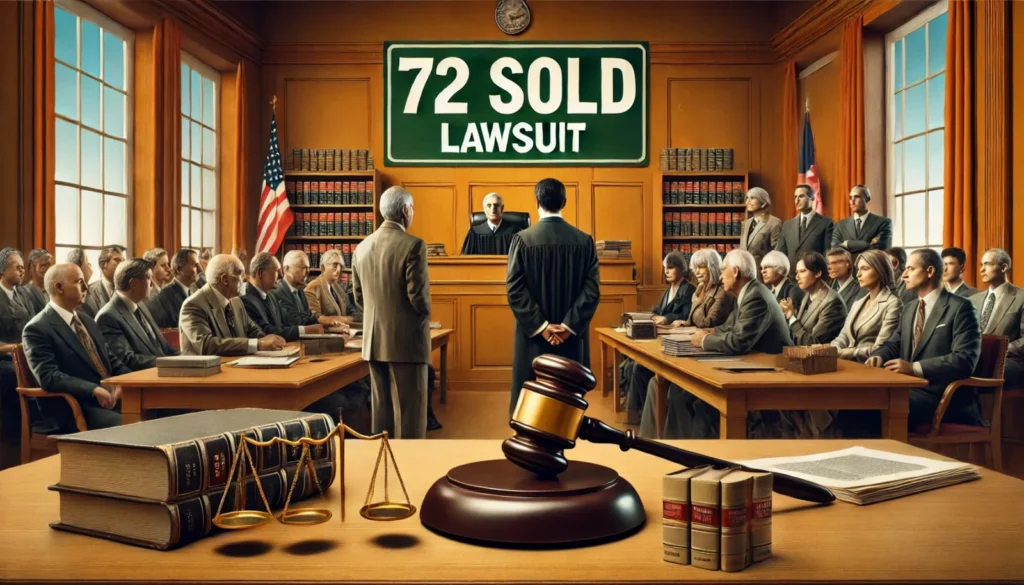Understanding the 72 Sold Lawsuit: Key Insights and Implications

What is the 72 Sold Lawsuit?
The “72 Sold lawsuit” refers to a legal action initiated in response to various grievances raised against the 72 Sold real estate program. This program, designed to expedite property sales within a 72-hour time frame, has attracted significant attention in the real estate market. The lawsuit primarily stems from claims by consumers alleging fraudulent practices, breach of contract, and unsatisfactory service related to the selling of residential properties.
At the heart of the lawsuit are several core issues that have raised concerns among participants in the real estate sector. Allegations include deceptive marketing practices that may have led homeowners to believe they were entering a streamlined and equitable sales process. Furthermore, there have been complaints regarding unexpected fees and commissions that were not adequately disclosed prior to the sale. Such issues have prompted scrutiny, not just of the practices employed by 72 Sold, but of the broader implications for consumer trust in real estate transactions.

In the context of the overall real estate market, the 72 Sold lawsuit emphasizes the ongoing challenges faced by homeowners and real estate professionals alike. Sellers who engage with innovative selling solutions often do so with the expectation of an uncomplicated experience. Conversely, the potential for contractual disputes may cause hesitancy among buyers. As the legal proceedings unfold, the outcome may not only impact the involved parties but also set a precedent for future real estate transactions and programs striving to offer expedited sales. The implications of the lawsuit could resonate across the industry, prompting changes to business practices aimed at enhancing transparency and consumer protection.
Impact of the 72 Sold Lawsuit on Real Estate Transactions
The recent 72 Sold lawsuit has sparked considerable discussion regarding its implications for real estate transactions. As the legal proceedings unfold, they reveal potential risks and changes in the operational framework of real estate businesses. One significant concern for agents is how the findings of this lawsuit may alter their sales strategies and client interactions. Given the nature of the claims, agents may need to adapt their marketing approaches to maintain trust and compliance with evolving regulations.
Moreover, the lawsuit has raised flags among potential sellers who are increasingly scrutinizing the 72 Sold system. As these individuals consider listing their homes, they may hesitate to engage with agents utilizing the 72 Sold model due to uncertainty around the subsequent impacts of the legal battle. This skepticism poses a threat to the credibility of the system itself, which could lead to shifts in client preferences and operational tactics employed by real estate professionals.
The ripple effect of the 72 Sold lawsuit may extend beyond individual transactions, potentially influencing overall market dynamics. For instance, if sellers begin to shy away from the 72 Sold model, scarcity in listings might drive prices down, affecting home sales across multiple sectors. Additionally, if a sizeable number of agents withdraw from utilizing the 72 Sold approach, this could lead to reduced competition, ultimately altering the landscape of real estate sales practices.
In summary, the 72 Sold lawsuit is poised to significantly impact real estate transactions by reshaping the way agents operate, generating skepticism among potential sellers, and influencing market conditions as professionals navigate the fallout from the ongoing litigation. Understanding these potential repercussions will be crucial for all stakeholders involved in the real estate industry moving forward.
Legal Perspectives on the 72 Sold Lawsuit
The 72 Sold lawsuit represents a significant legal scenario within the real estate sector, attracting attention from industry stakeholders and legal experts alike. At its core, the lawsuit involves allegations centered on marketing practices, commission structures, and potential misrepresentation of services rendered by the 72 Sold company. Legal experts note that such allegations could influence how real estate transactions are conducted, emphasizing the importance of transparency and adherence to legal standards.
The legal framework surrounding the 72 Sold lawsuit hinges on both state laws and federal regulations that govern real estate practices. Key statutes that may be relevant in this case include those addressing fair business practices, consumer protection, and disclosure requirements. Attorneys specializing in real estate law argue that the outcome of this lawsuit could set a precedent, potentially shaping the legal landscape for other similar cases where market practices are called into question.
Potential outcomes of the lawsuit can vary widely. For instance, if the allegations against 72 Sold are substantiated, the company may face penalties or be required to alter their business practices. On the other hand, a dismissal of the case could reinforce the legitimacy of the company’s operations, which would effectively absolve them from the allegations. Legal professionals suggest that both parties may also consider settlements as an alternative to lengthy litigation, which can be costly and time-consuming.
Moreover, this lawsuit may have broader implications for future legal considerations in the real estate sector. The growing scrutiny of business practices, especially in the digital marketplace, emphasizes the need for companies to ensure compliance with legal requirements. As such, stakeholders in real estate should remain vigilant of ongoing developments in cases like the 72 Sold lawsuit, as they could undoubtedly influence regulatory policies and operational standards in the industry moving forward.
How to Navigate the 72 Sold Lawsuit as a Consumer
Navigating the complexities of the real estate market can become considerably more challenging in light of the 72 Sold lawsuit. Consumers should prioritize their understanding of their rights and the implications of this legal action for real estate transactions. Firstly, it is essential for potential buyers and sellers to be aware of their consumer rights under local and federal laws. The Fair Housing Act and state regulations may offer protections against unfair practices during real estate transactions, making it crucial to familiarize oneself with these statutes.
When entering into a real estate agreement, consumers should meticulously review contracts to ensure that all terms are clear and fair. It is advisable to look out for clauses that may impose unnecessary fees or penalties, making sure that the contract complies with existing laws. Legal counsel or a trusted real estate professional can provide invaluable assistance in interpreting complex contracts, ensuring consumers make informed decisions.

For those considering the 72 Sold system, understanding the nuances of its operations is vital. Given the ongoing lawsuit, evaluating the methods and practices of the 72 Sold model is important. Consumers might seek testimonials or reviews from previous clients to gauge the experiences of others. Transparency is key; hence, engaging directly with agents to clarify operational details can be beneficial.
Additionally, exploring alternative strategies for selling a home can provide consumers with greater flexibility. Traditional methods, such as hiring a real estate agent with a strong track record, or leveraging technology through online platforms, may serve as effective alternatives to the 72 Sold model during this period of uncertainty.
By remaining informed and methodical in their approach, consumers can better navigate the 72 Sold lawsuit and make prudent choices in their real estate endeavors.


